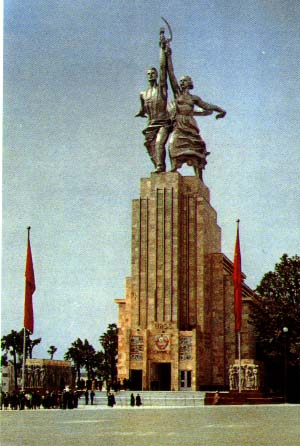
J. Hoberman advances in my estimation from my favorite film critic to one of my flat-out favorite writers with this fascinating collection of tone poems on a vast and (so we thought) important culture sinking further and further into the muck of nevermind. From contemporary Berlin’s hawkers of Commie kitsch to the earnest artists constricted by the aesthetics of an ever tightening code of Stalinist acceptability, Hoberman draws us a direct line from hardcore Kool-Aid drinking Socialist Realism to the left-wing’s reactionary Realistic Socialism. Hoberman’s thesis is that Communism in the USSR was a giant piece of performance art constantly shifting and repurposing its idyllic (and unreal) present to keep on pushing to that nearly graspable Utopia. The fascinating thing is how this process kept self-replicating amidst the various fellow-traveller groups, the anti-Soviet leftists of Middle Europe and, to a certain extent, anti-Communists (and anti-anti-Communists) in the USA.
Where there are Commies there are Jews and Hoberman spends nearly as much time discussing them. Did you know Stalin tried to set up a “Jewish Homeland” in the USSR before the Holocaust? And it kinda-sorta worked for a while? (At least it made for some good movies.) I shit you not: it was called Birobidzhan and I never heard of it either.
Hoberman spends a fascinating chapter running a timeline of Czech culture from the Prague Spring through the Velvet Revolution emphasizing the unique influence of literature and film. Here we see how Prague’s most famous artist, Kafka, had his works reinterpreted from a perspective completely alien to him and, as a result, made him the most important dissident alive or dead.
Hoberman is a film critic first, of course, and a major section of the book details 24 different “frames” of Communism’s refracted projection to our collective eye — from Eisenstein to John Milius, with stops for Z grade sci-fi and unfinished Hungarian sports documentaries.
The best is last, though — a fever dream of The Rosenbergs, wherein Hoberman one ups E. L. Doctorow and Tony Kushner by dreaming up a successful escape to Moscow for the L. E. S.’s doomed lefties. They still wind up executed by a kangaroo court. (Hoberman may occasionally dip into nostalgia over pink rhetoric and its CCNY trappings, but he never lets us forget that, never mind who coined the phrase, “evil empire” was apt and life comes very cheap on the five year plan.)
I’m so glad this book is out there. I like the fact the Hoberman is plugging away, describing architectural blueprints for pavillions never actualized and screening solitary prints of disowned films. While reading this book I gave a tour to some fairly with-it 8th graders. The Wall had been down for two or three years before they were born. The Soviet Union, when they learn about it in school, will seem only like some hazy, crazy temporary endeavor. Hoberman would argue that, at heart, that’s what it always was.







